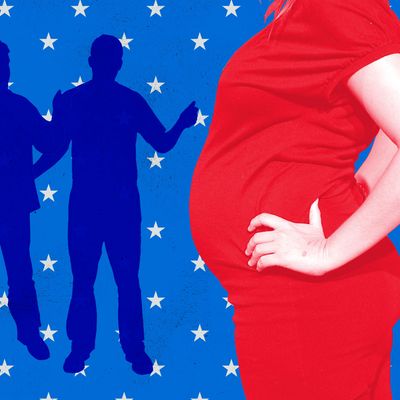
When Melissa officially announced her surrogacy to the congregation of the Hugoton Baptist Church in Hugoton, Kansas, where her husband Shane was the pastor, a woman stood up to interrupt: “So, you are really going to go through with this? You are giving this church and Jesus a bad name.” There were murmurs of support in the pews. Only one week prior, members of Melissa’s Bible study group had praised her altruism when she told them she planned to carry a child for a couple who couldn’t conceive. But news of the pregnancy had spread on Facebook, along with information about her surrogacy agency: Growing Generations helps gay couples have children. Melissa was clear she would only carry a child for a straight couple, but the mere association was enough to spark a protest.
“A month later, the whole town was on that side,” Melissa says. The fit, pretty 31-year-old is speaking only to me, but tells the story as though she is speaking in front of a camera. Shane, her soft-spoken 34-year-old husband, explains that the church hosted a townhall-style meeting about his wife’s surrogacy. “They were convinced we were carrying for a same-sex couple or that we were LGBT supporters,” Melissa says. “It felt surreal, like a witch hunt.” Two days later, Melissa, Shane, and their three young children packed a truck and moved to Texas, cast out of their church and 3900-person town. Pastor Bob Rich, who replaced Shane at the Hugoton Baptist Church, describes the events as “pretty typical of rural America.” He adds, “When Melissa made the statement that it was her body, not anyone else’s business, most felt she stepped over the line.”
On the day of the community meeting, Melissa stayed with the kids in the family’s two-story church-owned home while Shane went to address the crowd. Melissa remembers it as an uncharacteristically warm spring day; Shane remembers it as the worst day of his life. He estimates 50-60 people attended the meeting. He was accused of playing God and urged to resign. “The questions had nothing to do with surrogacy and my being a pastor,” he says. “It was all about squeamishness about homosexuality and quoting scripture.”
“It did get heated,” admits Hugoton Baptist regular Didi*, who attended the meeting and considered herself one of Melissa’s friends. Though Didi admits that nearly everyone opposed Melissa’s choice, she says they were merely “standing up for their belief.” Didi says she abstained from taking sides, but is quick to lay blame with Melissa: “She always knee-jerk reacts … She never thinks before she speaks and she never thinks about others.”
The couple packed up their home and moved out on a Sunday, while church was in session with a temporary pastor. A few months later, Pastor Rich permanently took over Hugoton Baptist’s pulpit. “The people of the congregation were and are anti-gay, standing on Biblical belief,” he explained in an e-mail. “The congregation and the leadership made it a very clear statement that, if I were to come as the next pastor, I would go on record as opposing such lifestyle.”
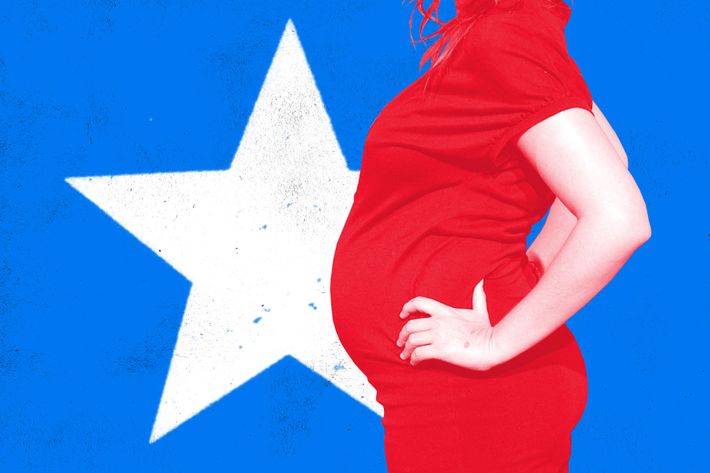
Though Melissa and Shane’s experience was extreme, this type of culture clash is becoming more common. In 2010, the first year the U.S. Census counted gay couples and their children, one quarter of same-sex households were found to be raising children; as gay unions increase, some surrogacy firms have seen a spike in affluent, urban gay couples seeking IVF and surrogacy. New York Fertility Services medical director Joel Batzofin says his firm’s intended parents live primarily in urban centers like New York, Los Angeles, London, and Hong Kong. Surrogate carriers are more likely to be middle class and from conservative backgrounds, mostly rural areas in the Midwest and South. Parents tend to be well-off; using both a surrogate and an egg donor costs between $115,000 and $130,000. Earnings for surrogates like Melissa, meanwhile, start at $25,000. The result is one of modern medicine’s strangest bedfellows: devout Christian women lending their wombs to gay fathers. The relationships they forge can challenge and surprise both sides.
Stuart Bell, CEO of Melissa’s gay-friendly firm Growing Generations, believes that this culture clash makes surrogacy for gay parents an inherently political act. “[Surrogates] are changing the world more significantly than the gay parents are,” he said. “The gay parents are going back to areas that are most likely already pretty accepting. L.A. and New York City are the extremes, they’re outliers in America. But a lot of these surrogates are from towns where there may not be any openly gay people. So this has a huge impact on their children and on their schools.”
Melissa says she found Growing Generations by typing ‘‘how do I have a baby for another couple” into Google. “I just clicked on the sites that Google brought up,” she says. As for the firm being gay-friendly and owned by a gay man? “I didn’t see that,” she insists.
But Shane doesn’t believe her. “I have no doubt that Melissa saw that in there,” he now says of Growing Generations’ gay-friendliness. “Or she knew deep down.” Though the couple opposed marriage equality in public, Melissa played devil’s advocate when they discussed it privately. She admits now to feeling torn about treating homosexuality as a sin: “I remember, before all this happened, sitting with my husband at the table and saying, ‘If this is a choice, when did I decide to be heterosexual?’”
As a prospective surrogate, one of the first questions Melissa had to answer was whether she would consider carrying for a gay couple. “No,” she had answered. After leaving Hugoton, Melissa stuck with her plan and carried twins for a straight couple. By then, of course, backing out was not an option: Shane was out of work and they needed the money.
“We’ve had other surrogates kicked out of churches,” says Bell. “And we as gay people have faced exclusion and ridicule our whole lives. It’s more shocking for [surrogates] because they haven’t faced that before. Being straight and white in this country comes with a certain privilege. But carrying for gay couples, they come to experience the kind of things that we as gay people experience all the time.”
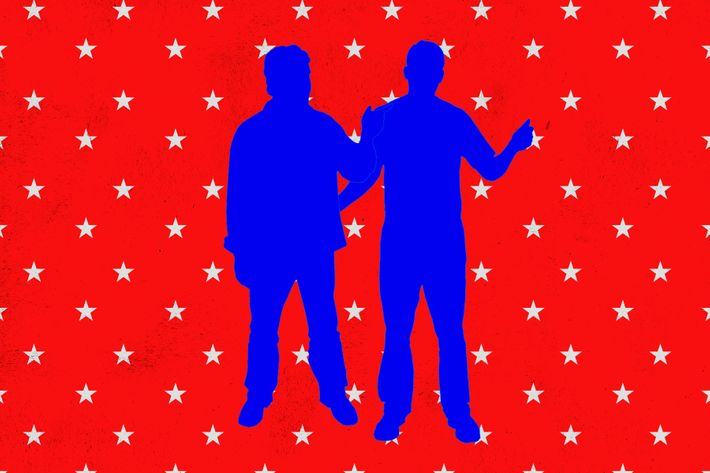
The culture shock goes both ways, however, and gay couples seeking surrogates bring their own baggage when working with red-state mothers. Brian and Stelian, ages 49 and 46, are a marketing director and an anesthesiologist. They have matching shaved heads and live together in the middle of Greenwich Village in a church that has been converted to slick condos. (The interior design features stained-glass art pieces and a painting of Jim Morrison on the cross.) A few years ago, after a friend used a surrogate, they decided they would, too.
When they first met the small-town Massachusetts woman who would become their surrogate, the trio instantly clicked. At a dinner after their initial meeting, they talked for hours nonstop. Susan* was funny and a hard worker, “someone you’d want on your team,” the men agreed. Even when she took double shifts at her waitress job, she’d find time to make a home-cooked dinner for her kids.
“I was relieved that she was a real ‘take control’ person” says Brian, peering through black-framed eyeglasses with lavender-tinted lenses. “I was worried there would be a lot of hand-holding, but she was the one who ended up guiding us through the process … I sort of expected surrogates to be women who needed money and were more desperate. Our surrogate loved being pregnant and was in charge of her body and the situation.”
The couple was a little offended by their friends’ assumptions about Susan. “They would say things like, ‘Tell us about your surrogate! Is she some sort of underprivileged woman?’” Brian recalls.
(Though the surrogates I spoke to were not poor, they were stay-at-home moms and surrogacy was an important source of income aside from their husbands’ salaries. Dr. Batzofin notes, “Generally speaking, many surrogates are from mid-to-lower socioeconomic groups. Maybe husband is something like a construction worker and they’ve already got two or three kids at home.”)
Brian and Stelian see their surrogate as an extended family member or a friend. The only clashes they had were of the Modern Family variety — and on or about Facebook.
“I liked that our surrogate had small-town values. It made me feel like I could trust her,” Brian explains. “But she did play the pregnancy out on Facebook, which was a stressful experience. Small-town drama.” He and Stelian recalled waking up to a status update about how their surrogate had gone to the hospital in the middle of the night, and panicking. When they called, it turned out to be nothing. After letting the baby’s name slip during one giddy visit, the men swore their surrogate to secrecy — then saw the name appear on Facebook an hour later. “We had to be like, ‘No take it down! We don’t want our families seeing this yet!’” Brian remembers.
But the biggest culture shock occurred at their surrogate’s small-town hospital. Stelian works in a New York City hospital, where nontraditional families have babies every day. But in rural Massachusetts, their trio was a first. “All of the forms had places where you had to list mother and father,” Stelian explains. “We had to have DNA testing and they didn’t know how to do that for gay couples. We made a lot of suggestions. It was a whole new experience — the nurses desk told us, ‘you guys really broke through.’”
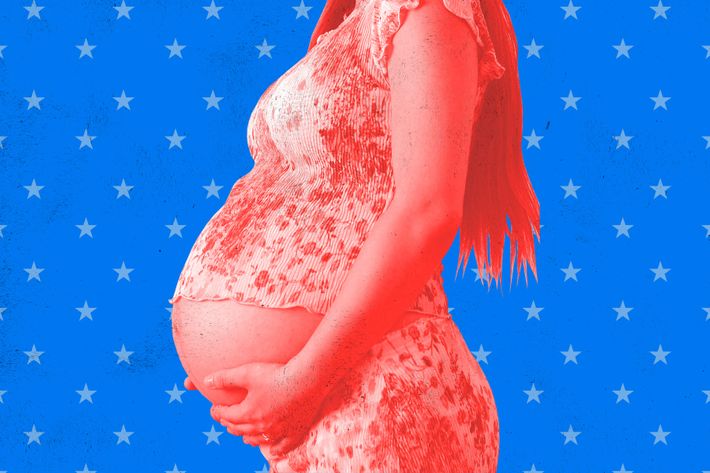
Fraught cultural politics aren’t the only novel side effect of surrogacy for gay parents; surrogates can also find that gender dynamics change the experience emotionally. Tina is a surrogate who lives in Idaho with her husband and two kids. Over the last four years, she has carried for three couples, both gay and straight. As a Christian living in a conservative region, she had always opposed gay marriage and had initially agreed to carry only for straight couples.
Her first surrogacy experience, however, made her question that decision.
The surrogacy had started off promising — after sending a video of the positive at-home pregnancy test, she and the intended mother were in constant contact. “She called me every day and I liked having her feel included in the pregnancy,” says Tina. A petite woman with a shiny brown bob haircut and freckles, Tina’s voice is upbeat even as she describes how her mood plunged in the delivery room.
“The nurse kept turning her back to me when discussing things with the mother,” Tina explains. “They just made me feel very isolated. I was treated more like someone who was giving her baby up for adoption.” After giving birth and leaving the hospital, she didn’t hear from the mother for weeks.
Before carrying again, Tina read accounts from other surrogates online. When it came to gay couples, “I never came across a negative story.”
On message boards like AllAboutSurrogacy or SurroMomsOnline, this generalization does ring true. In one post, a woman writes, “Can someone please explain that apparent obsession with gay men and gift wrapping?” before detailing goods sent from the intended fathers. In another, a woman raves about an iPod her intended fathers bought her with the inscription “To our Baby Mama.” The dose of unfiltered positivity may be partly about cultural cachet: Carrying for gay couples is liberal and urbane, and therefore cool.
But there’s also a certain sadness that’s culturally associated with a woman who cannot bear her own children. Without a uterus between them, a gay male couple can go into the surrogacy without that emotional baggage.
Tina made her new decision quickly, trusting her gut. She contacted her fertility agency and said she wanted to carry for a gay couple. Initially she avoided telling her friends what she was doing. But after sitting through an anti-gay sermon at her church, Tina snapped. The preacher compared having a gay child to having a child die. From that day forward, Tina was blunt when people asked about the mother of the twins she was carrying: “They have two dads, and that is okay,” she recalls saying. In subsequent conversations, Tina says, some of her conservative friends became supportive of gay rights.
Tina’s family also got an education. During a visit with the intended fathers, Tina’s 6-year-old daughter asked why they wore wedding rings. “But you can’t be married to a boy!” she squealed, prompting Tina to explain non-heterosexual families to her for the first time.
When Tina went into the labor, the fathers couldn’t get a flight out until after the twins were born. In contrast to her first surrogate birth, this time Tina had plenty of alone time to lounge in bed with the babies and say good-bye. “My husband and I lived in this relationship with them, so it felt like closure. We got to love on the boys and inspect and kiss them and when their dads got there at 2:30 a.m., we handed them their babies.” Tina says next to the birth of her own children, this was the happiest moment of her life.
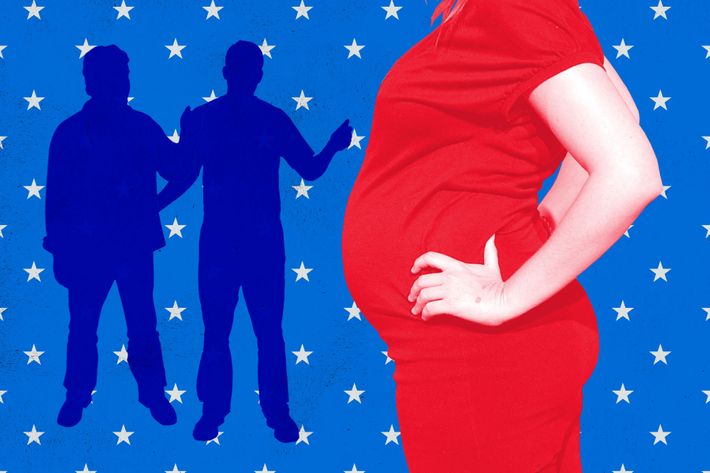
As Melissa and Shane settled into their new life in Texas — she as a surrogate, he seeking a graduate degree in psychology — their ideology shifted. Melissa became adamantly pro-gay-rights. This year Melissa embarked on her second surrogacy experience. She carried for a gay couple.
Shane required some convincing. “I was against causing more harm to our family, and it took a while to get to ‘homosexuality is not wrong,’” he explains. “But after eight or nine months, I really got behind things and I loved the direction we were going. My wife is sort of a hero to me.”
Shane and Melissa knew the choice would mean alienating some family members, including her father and Shane’s parents. Melissa still receives Facebook hate messages from members of the Hugoton Baptist Church. But she also felt she didn’t have anything to lose.
Texas law does not allow two same-sex parents on a birth certificate. So Melissa ended up carrying for a single gay man from L.A. In Hugoton, the couple hadn’t had gay friends. “I’ve been so sheltered in religious circles growing up, I had never been around gay people,” Shane notes. “I am certain that people where we lived did not know anyone who was gay. You pretty much saw everyone, and there was no one who was gay and open about it, or even seemed gay [in Hugoton].” But they hit it off with their intended father in their first meeting. When Melissa told him about becoming a Hugoton outcast, they all started crying.
“Our intended father’s response was that I had received more homophobia than he had in his life as an out gay man,” says Melissa. He wondered whether it would be safe for her to carry his baby. Melissa told him yes, but there would be backlash. But people were starting to come around.
* Not real names.




